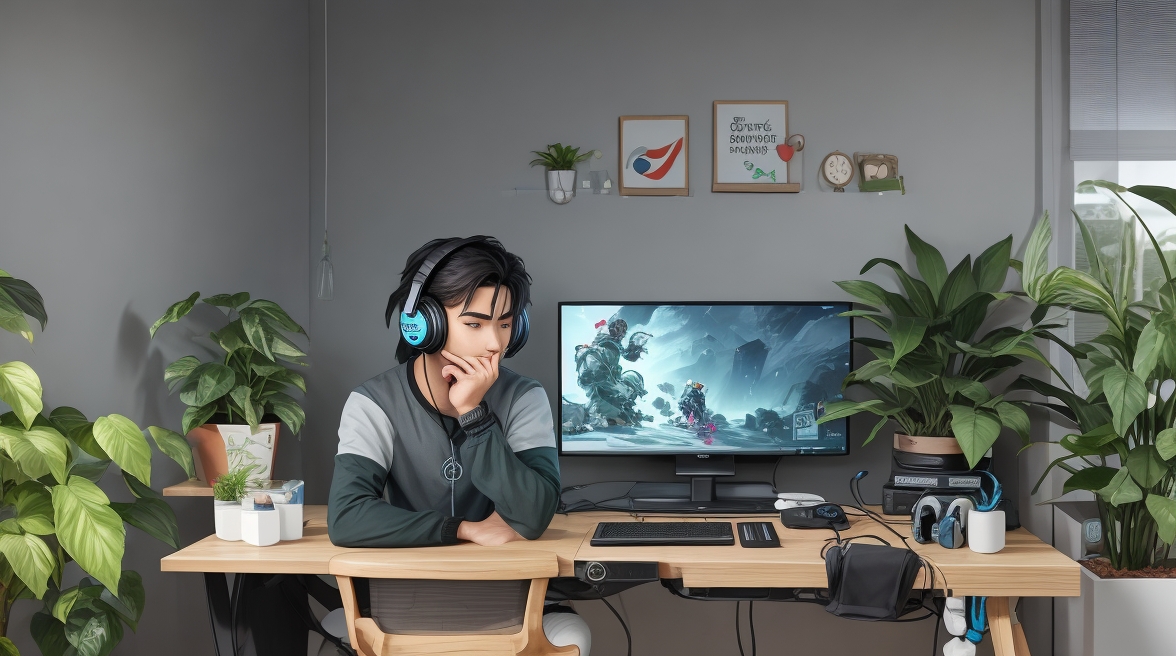How to Maintain Balance in Gaming-Related Mental Health
Overview of Gaming Affects on Mental Health:
Beyond being a hobby, gaming has become a vibrant community and an essential aspect of contemporary society. But as the gaming business expands, so do player worries over mental health. This article provides helpful advice for a healthy gaming lifestyle and examines how to preserve gaming affects on mental health while playing your favourite games.
Recognizing How Gaming Affects Mental Health
The Advantages of Video Games
Although it has a reputation for being stressful, gaming has many positive effects on mental health. Playing games can enhance cognitive abilities, give one a feeling of accomplishment, and even strengthen social bonds.
Cognitive Benefits: Playing games improves hand-eye coordination, strategic thinking, and problem-solving abilities.
Sense of Achievement: Reaching objectives and finishing game obstacles can give players a feeling of success and increase their self-esteem.
Social Connections: Players can lessen their loneliness and create enduring friendships through online multiplayer games and gaming communities.
Possible Dangers to Mental Wellness
Even with these advantages, playing video games too much or developing bad gaming habits can be detrimental to mental health. It is vital to acknowledge these dangers to preserve equilibrium.
Addiction: Excessive gaming can result in addiction, which is typified by a lack of self-control over gaming time and a disregard for obligations.
Social Isolation: Playing video games too much can result in fewer in-person encounters and more excellent social isolation.
Gaming late at night can disrupt sleep cycles, which can cause weariness and other health problems.
Techniques to Preserve Mental Well-being While Playing Video Games
Establishing Healthful Limits
Clearly defining boundaries is one of the most critical components of balanced gaming. It entails controlling how much time and emotion you devote to gaming.
Time management: Set aside specified times to play video games and adhere to them. Set alarms or timers to help you remember to take breaks.
Set Priorities for Your Responsibilities: Gaming should not interfere with your key obligations, such as your job, school, or family.
Taking Intermittent Rests
It’s critical to take breaks to avoid burnout and preserve general well-being. Putting these strategies into action can be beneficial:
Scheduled Breaks: Take a quick break every hour to stretch, put your eyes down, and unwind. It lessens mental and physical exhaustion.
Take Part in Other Activities: To maintain a varied and well-balanced existence, make time for hobbies or other pursuits outside gaming.
Sustaining a Healthful Way of Life
A balanced way of living improves mental health and makes gaming more enjoyable. Here’s how to include wholesome routines into your daily life:
Exercise: Regular exercise lowers stress and elevates mood. Try to get at least 30 minutes of exercise on most days of the week.
Nutrition: A well-balanced diet helps increase energy and focus. Avoid sugary snacks and excessive caffeine intake, which may affect your focus and mood.
Sleep hygiene: To guarantee adequate restful sleep, set up a consistent sleep regimen and a calming nighttime ritual.
Creating a Friendly Gaming Environment
Making your gaming space a happy one can significantly impact your mental health. Think about these suggestions:
Positive Community: Participate in polite, encouraging, and supportive gaming communities. Avoid harmful situations that exacerbate anxiety and stress.
Select video games that reflect your hobbies and values when engaging in mindful gaming. Choose games that encourage enjoyment and relaxation over anxiety and annoyance.
Identifying and Treating Addiction to Video Games
Recognizing Addiction to Gaming in Signs
Addiction to video games is a severe problem that can negatively impact mental health. Recognize the following symptoms:
Neglecting tasks: Regularly putting games ahead of significant functions in life.
Emotional Distress: Experiencing agitation, fear, or depression while unable to play or when faced with problems with gaming.
When you stop gaming, you may have mental or physical withdrawal symptoms.
Getting Expert Assistance
Should you or someone you know be suffering from gaming addiction, professional help is essential. Counsellors and therapists with expertise in gaming addiction can offer assistance and treatment plans.
Therapy: To treat problematic gaming habits and underlying difficulties, cognitive-behavioural therapy (CBT) and other therapeutic approaches can be used.
Joining a support group can provide a feeling of community, shared experience, and emotional and practical assistance.
Improving Mental Well-being with Mindful Gaming
Put mindfulness into practice.
Mindfulness can enhance your gaming experience by lowering tension and encouraging calm. Try these techniques:
Play the game with complete attention and presence. Refrain from multitasking or daydreaming.
Breathing Techniques: Use deep breathing to keep you composed and concentrated while playing.
Consider Your Video Game Experience
Consider your gaming habits and how they affect your mental health regularly. With this self-awareness, you can preserve a healthy balance and make the required modifications.
Self-Assessment: Regularly assess the impact of gaming on your relationships, everyday life, and mood.
Modify Your Objectives: Establish reasonable gaming objectives that complement your way of life and general well-being.
In summary
Gaming and mental health must coexist in a way that values awareness, self-care, and preventative measures. You can use gaming to enhance and improve your life by knowing how it affects mental health, establishing healthy boundaries, and keeping a supportive atmosphere. Recall that leading a healthy gaming lifestyle requires mindfulness and balance.












Leave a Reply